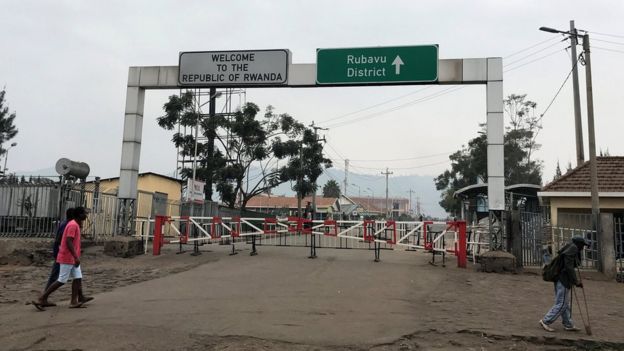Rwanda Reopens Border with DR Congo Amid Ebola Crisis Outbreak

Rwanda has
reopened its border with DR Congo, where an Ebola outbreak has killed more than
1,800 people in the past year.
The border
was closed for several hours after the confirmation of a third death from Ebola
in the Congolese city of Goma.
At least
2,700 people have been infected in the worst Ebola outbreak in the country's
history.
Tackling the
disease has been complicated by conflict in the region.
About 12 new
cases are being reported every day in Democratic Republic of Congo, the World
Health Organization (WHO) reports.
Last week,
the WHO designated the outbreak of Ebola a global health emergency, its highest
level of alarm, but warned against trying to contain the virus by closing
borders or restricting travel or trade.
Goma, home
to two million people, is the capital of North Kivu, one of the two provinces
in DR Congo which have borne the brunt of the epidemic.
The city
lies just across the border from the Rwandan city of Gisenyi, which has a
population of around 85,000. Many residents cross the frontier for work and
other activities - although illegal routes are also used.
The border
had been closed "to avoid unnecessary crossings" to Goma, Gilbert
Habayarimana, mayor of Rubavu district in western Rwanda which borders Goma,
said earlier.
The
Congolese presidency had criticised the decision to close the border, and
people on the Rwandan side rejoiced after it was reopened.
Rwanda's
government has intensified cross-border monitoring, advising citizens to avoid
unnecessary travel to Goma, according to Health Minister Diane Gashumba.
Life goes on
pretty much as normal in both Goma and Gisenyi, although some got worried when
the two official border crossings were closed earlier on Thursday. And soldiers
and police were also deployed to the many unofficial crossing points which
people often use.
Thursday is
a public holiday in DR Congo, Parents' Day. People clean up the graves and pay
respects to their deceased relatives in the morning before taking gifts to
their parents. Most people were still shaking hands and embracing when meeting.
Only a few have stopped since Ebola was confirmed in the city.
The only
major change is that water taps have been set up in public buildings, where
people have to wash their hands before entering, and at the two official border
crossings.
There are
still quite a few in Goma who still do not believe that Ebola exists but this
might change now that another person has died.
A third case
of Ebola has been confirmed in Goma, raising fears the virus could spread in
the densely populated city.
The patient
is the daughter of an artisanal miner who died on Wednesday. He had come from
Ituri, the other province where many cases have been confirmed.
The other
victim in Goma was a priest who died last month.
Efforts to
control the outbreak have been hampered by violence against healthcare workers
or Ebola treatment facilities. Seven people have been killed and 58 injured in
198 attacks this year.
Another
major problem has been distrust of healthcare workers. As a result, about
a third of deaths have not been at specialist treatment centres, but in the
community, where there is a greater risk of the disease spreading to neighbours
and relatives.
The
designation has only been used four times previously, including during the
Ebola epidemic that killed more than 11,000 people in West Africa between 2014
and 2016.
The WHO has
also said it has insufficient money to tackle the problem. It had estimated
that it needed $98m (£81m) to tackle the outbreak between February and July,
but it faced a shortfall of $54m.
Ebola is a
virus that initially causes sudden fever, intense weakness, muscle pain and a
sore throat
It
progresses to vomiting, diarrhoea, and both internal and external bleeding
People are
infected when they have direct contact through broken skin, or the mouth and
nose, with the blood, vomit, faeces or bodily fluids of someone with Ebola
Patients
tend to die from dehydration and multiple organ failure
Yes, there
is. It is 99% effective and more than 161,000 people have received it.
However, not
everybody is vaccinated - only those who come into direct contact with an Ebola
patient, and people who come into contact with them. And some of those people
refuse to take it.
People give
a variety of reasons for not taking the vaccine, including:
They may
have religious beliefs that do not permit them to take vaccines
They may
think they do not need it
They may not
believe in Ebola
The vaccine,
made by Merck, was developed during the epidemic in West Africa and has been
available throughout the latest outbreak.
It has
proven effective but is in relatively short supply, so the WHO recommended a
second vaccine made by Johnson & Johnson to complement it.
But DR
Congo's Health Minister Oly Ilunga complained that the Congolese were being
treated as "subjects of experimentation", according to Reuters news
agency, and he resigned over the issue.
FROM .bbc.com/news/world-africa-

No comments